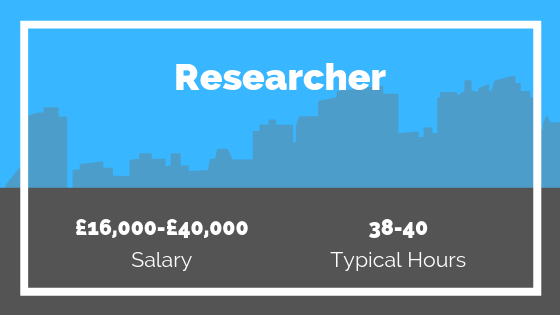
What is a Researcher?
Researchers are employed on productions where factual data is needed or where there is a need to employ ‘real life’ people as part of the production. Researchers may also be employed when there is a need for fact checking on historical productions.
Generally, you can find researchers working on anything from commercials and corporate videos to feature documentaries and soaps. The job role of the Researcher is one for those who are ambitious and looking to climb the career ladder.
As with any job role, the scope of the Researcher role depends on the Producers and the size of the production. Thus, the job role could be heavily focused on research activities or may in some instances include activities relating to the production. Researchers can work across a variety of locations. While some may be office based others may be required to work undercover to collect information for a production.
There are many different types of Researchers to include: Junior Researchers, Casting Researchers, Developments Researchers and Shooting Researchers. In this article, we shall be talking you through the general responsibilities of a Researcher and the skills you will need to become one.
During pre-production, the Researcher will meet with the Director, Producers, and Scriptwriters to discuss the needs of the production according to the brief. In this process, the research which needs to be undertaken will be outlined. Then the Researcher will be responsible for collecting factual data related to the TV, radio or film production.
Researchers are also responsible for helping to generate and develop new production ideas. Working to the brief, the Researcher will help to inform the development of new programmes by providing relevant factual details and creative ideas. They will subsequently brief these ideas to the scriptwriters for conceptualisation in the form of a report of brief.
Common tools for research include the internet, film and tape archives, specialist collections, libraries, museums, and government departments. You will need to check for potential copyright issues and gain additional permissions as needed.
During pre-production you will help to identify extra materials that may be required, for example props and music. If necessary, you may also conduct preliminary interviews with potential contributors to be featured in the production and be responsible for the creation of consent forms. Other administration duties may include the booking of resources and facilities and assisting with contracts. Depending on the production, you may also be expected to assist in the filming of interviews and in organising the transport for contributors.
As this process progresses, Researchers are often expected to assist in the editing and updating of scripts. In this role, fact checking is second nature as the Researcher will be expected to ensure that facts are historically accurate. When collecting factual information it is important to cross reference facts, and where possible, find secondary sources. The Researcher should present their findings in a clear and concise way and remember that different Producers have different preferences.
Want to know more? Here are some essential tips for becoming a factual researcher:
Salary
According to the National Careers Service, a Researcher can expect to earn anywhere between £16,000 to £40,000 depending on experience and location. As with many jobs in this industry, working hours can often be long and unsocial and in some instances you may be expected to work over weekends. But, in this job role drive and determination is rewarded.

However, freelance and short-term contracts are common for this role. Researchers are usually only hired for specific program needs. This means that contracts can be as short as two months. Although, this sporadic employment can be overcome by building your name in the industry and in turn securing permanent contracts. If you are looking to start out in this career why not take a look at our article about how to become a Junior Researcher.
Key skills
- Presentation skills
- Determination
- A keen eye for detail
- Organisational skills
- Excellent oral and written abilities
- Mathematical skills
- Logistical skills
- Interpersonal skills
- Creative flair
- Ability to work to tight deadlines
How to Become a Researcher
While no specific qualifications are needed to become a Researcher, skills developed from undertaking a degree can be particularly useful in this job role. In particular, a qualification from a university in broadcasting media, English, history, journalism or politics could be useful. The Met Film School offers many courses such as Documentary Filmmaking which teach how to research, write, produce and edit productions.
If university is not the route for you, you could look to gain a diploma from a college in creative media, creative media production or creative media production and technology. You can find out more about these qualifications here.
Failing this, it is important to have a good understanding of the production process, usually gained through on-the-job experience and training. If you are lacking experience you could look to gain experience through working at a local radio station or community production. Further, you could look to volunteer your time working for a local newspaper.
Become a Researcher Today!
If you are ready for the next step in your career, why not take a look at the latest Researcher vacancies on our jobs board? You can view our latest vacancies here.
